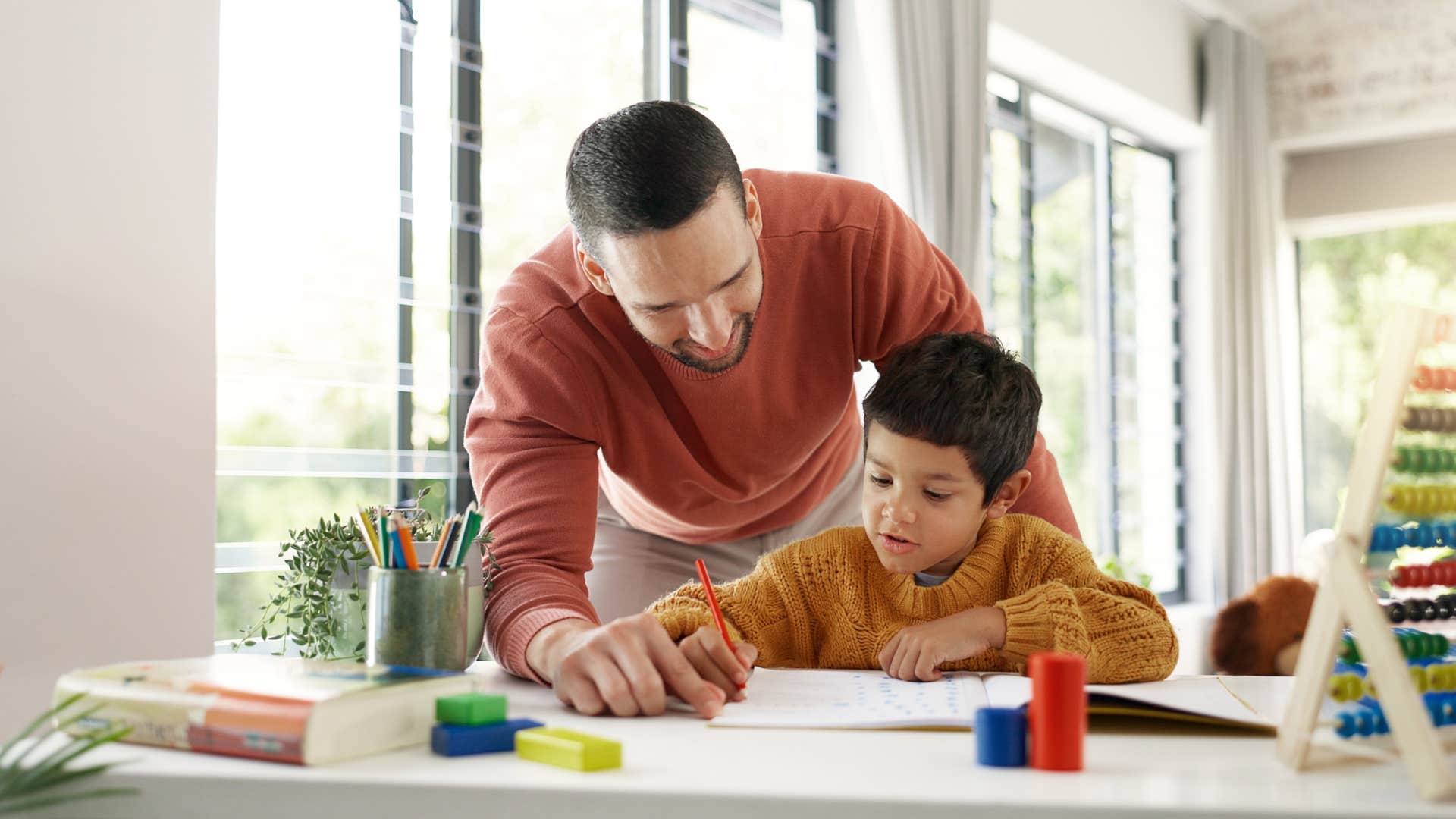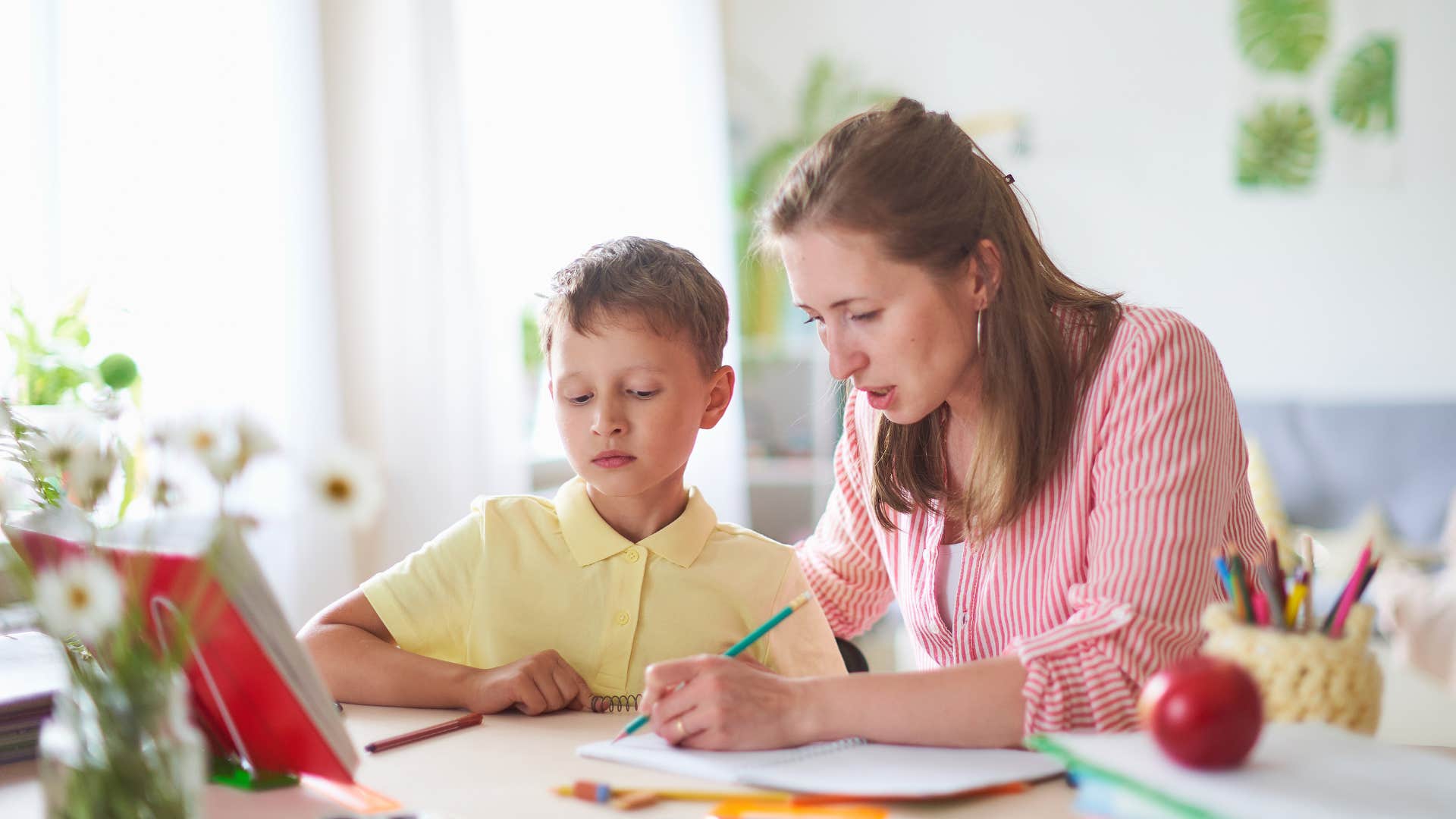11 Phrases Parents Say That Instantly Annoy Every Good Teacher
Sometimes, teachers feel like their students' parents just won't let them do their jobs.
 Krakenimages.com | Shutterstock
Krakenimages.com | Shutterstock No matter how good a teacher is, they're bound to get annoyed by parents at some point. It's like a law of nature. Some parents want to be really involved in their kids' lives and know everything that is going on at school. As a result, they might overstep and ignore some boundaries, eventually using phrases parents say that instantly annoy every good teacher. On the other hand, some parents aren't very involved and don't do enough.
In an study published in the journal Teachers and Teaching, researchers explained that, ideally, parents will be seen as partners in their children's education. However, they also noted, "We found that teachers see parents as part of their professional jurisdiction and a task they must address rather than partners or collaborators." Some of the things that parents say can definitely contribute to this perception by teachers.
Here are 11 phrases parents say that instantly annoy every good teacher
1. 'My child is special'
 PeopleImages.com - Yuri A | Shutterstock
PeopleImages.com - Yuri A | Shutterstock
Few things annoy a good teacher more than parents insisting that their child is special or better than the others in some way. Everyone has their own unique strengths that they bring to the table, and everyone is special, with no one kid being more so than another. Still, parents refuse to accept that their child is anything less than the classroom prodigy.
Currently, the U.S. Department of Education believes that 6% of students enrolled in public school are part of gifted and talented programs. According to the Hechinger Report, there may be up to 3.6 million students who should be labeled as gifted but aren't. While 6% doesn't seem like a huge portion of students, several million is still certainly a lot.
When parents imply that their kid is the only special one in class and deserves some kind of different treatment because of it, they are overlooking the talents of all of the other students in that classroom. They are also implying that their kid deserves more attention from the teacher then they're currently getting, when the teacher is surely aware of the student's strengths.
2. 'The last teacher did things differently'
 Nicoleta Ionescu | Shutterstock
Nicoleta Ionescu | Shutterstock
Students and teachers can develop a really special bond over the course of a school year. If a child reacted to one teacher and their teaching style well, it can be hard to move on to someone else.
Each teacher has their own way of doing things, and some won't click with certain students as well as others do. Parents may take this the wrong way and make a comment, meaning that the current teacher isn't doing things as well as the previous one.
According to a study from NYU Steinhardt, "Effective teaching is concerned with the student as a person and with his general development. The teacher must recognize individual differences among his/her students and adjust instructions that best suit to the learners." In this sense, teachers are responsible for adapting different teaching styles to students. However, that doesn't mean that it is their entire focus.
If a teacher spent all of their time working individually with each student, they would never get anything done. If a student needs help beyond what is happening in the classroom, at some point the parents have to step forward and take responsibility for that as well. They are part of their child's education, too.
3. 'My child never misbehaves'
 PeopleImages.com - Yuri A | Shutterstock
PeopleImages.com - Yuri A | Shutterstock
If a student is misbehaving in school, it would be common practice for the teacher to reach out to their parents and try to get some back-up from them. They may not be quick to give it, though. Some parents may claim that their children are perfect little angels who never do anything wrong, and nothing will sway them in that belief.
Editorial director of the Child Mind Institute, Caroline Miller, noted that there are almost always students in a classroom who are disruptive. They'll get some to follow their lead, and others will be distracted by their behavior. "It doesn't take many to seriously detract from the opportunity teachers have to actually teach," she said.
If a teacher reaches out to parents for help with their child's behavior and they don't receive that help, their entire classroom could suffer because of it.
Valuable instruction time will be stolen from other students as well. As one of the phrases parents say that instantly annoy every good teacher, there's nothing more frustrating than parents who don't want to help their child.
4. 'I don't agree with how you are doing this'
 Pixel-Shot | Shutterstock
Pixel-Shot | Shutterstock
Some parents are overly involved in their children's education and want to micromanage every aspect of it. They will pay close attention to what the teacher is doing in the classroom and criticize it at any chance they have. Teachers are somewhat like substitute parents during the day, and help students with many important things. But that doesn't give their actual parents the right to argue with how they are handling their class.
Mark Phillips, a teacher and educational journalist, said, "It's important that parents understand they can't control what happens in class and that the classroom is the domain of the teacher. Similarly, teachers have to let go of any notion that they can control what happens in a student's home. What each can do, however, is listen carefully to see if they can learn something from the other about what could improve things for the student in either of those settings."
Parents can't take over for teachers in the classroom, no matter how badly they might want to. There has to be a certain level of trust there as they allow their child's teacher to do their job. Without that, parents could end up saying some pretty hurtful things.
5. 'My child is so smart'
 Alexander_Safonov | Shutterstock
Alexander_Safonov | Shutterstock
A parent could become critical if they feel like their child has always done well academically and excelled in school, but something has changed in this school year. Their first instinct would likely be to blame the teacher, who they would annoy with their comments. They would harbor the belief that the teacher was doing something wrong that set the student up for failure.
Jeanne Huybrechts, chief academic officer at Stratford Schools, explained that it is concerning when children who are known for doing well begin to have a hard time in school, and parents should be responsive. However, as she also pointed out, "Parents should expect that their child's teachers, who have similar aspirations and expectations for their child, will partner with them in this endeavor."
Parents and teachers are meant to collaborate, not clash. If a parent feels like their child is not living up to their potential, that is a problem that should be addressed. However, they can't do so combatively or on their own. They need the teacher's help, not annoyance.
6. 'You must not have taught it correctly'
 wavebreakmedia | Shutterstock
wavebreakmedia | Shutterstock
Teachers are used to parents micromanaging their lesson plans, as evidenced by one of the phrases parents say that instantly annoy every good teacher, which involves telling a teacher they haven't taught something properly.
If a student is struggling to grasp a certain concept or subject, instead of considering their child's lack of ability for the subject matter, parents may choose to point the finger at the teacher and claim they are not doing a good job. The parents may even claim that the teacher doesn't know the subject well themselves. All of this would be greatly annoying for any teacher.
ERIC Clearinghouse on Elementary and Early Childhood Education pointed out that it's parents' and teachers' jobs to work together for the good of the child. "It is important for teachers and parents to remember that they know the child in different contexts, and that each may be unaware of what the child is like in the other context," they said.
"It is also important for teachers and parents to remember that the foundation for good parent-teacher relationships is frequent and open communication and that both teachers and parents share the responsibility for creating such a foundation."
Instead of petty squabbles, parents should support teachers' efforts and give them the help they need. Criticizing a teacher for not doing a good job doesn't help anyone in this situation. It's important to try to be understanding of teachers and the essential work that they do.
7. 'My child was telling the truth'
 Bangkok Click Studio | Shutterstock
Bangkok Click Studio | Shutterstock
Although they're unfortunate, fights at school are relatively commonplace. It's easy to end up in a situation where one student says one thing while another has an entirely different story. In these cases, parents are most likely to believe their own child, regardless of who was really telling the truth. But the teacher is almost sure to know what really happened, and they would be understandably annoyed if a parent tried to challenge their version of events.
Journalist and educator Dana Brown said, "Before becoming angry, yelling or calling the principal, allow teachers to explain possible miscommunications. After all, what you heard from your five-year-old may not be the most accurate description of the situation."
It's important for parents to remember that teachers are the adults in the room, and they have control of the situation. And if they need help, they know how to access it. They don't need parents accusing them of lying on top of everything else they're already dealing with.
8. 'You need to change that grade'
 Krakenimages.com | Shutterstock
Krakenimages.com | Shutterstock
If a student gets a bad grade, it is very likely their own fault. Maybe they didn't understand the concept to begin with, or perhaps they neglected to study. Whatever the case may be, bad grades happen, and teachers give them out fairly. Parents may not agree with that, though. If their child gets a bad grade, they may demand the teacher change it, even if it was rightfully earned.
It's possible that the teacher noticed the bad grade before the parents even did, and instead of arguing over who is to blame, they can work together to help the child do better in the future.
Parenting and education expert Gigi Schweikert said, "It's important for parents to voice the problems that the child may be facing to their teachers. This is something the teacher may already be trying to address in the classroom, and together, the parents and teacher can create a plan so the child can succeed." Collaborating is always a better choice than tearing a teacher down.
9. 'My child can't sit next to them'
 Drazen Zigic | Shutterstock
Drazen Zigic | Shutterstock
It's very possible that parents will have a preference for who their child sits next to in class. While some may prefer for them to sit next to a friend or a child whose family they know, others may want them to sit next to well-behaved students who excel academically and be away from those that are troublemakers. But it's likely that the teacher has a seating chart, which has already assigned the student to a certain spot.
Of course, this is just a teacher doing their job. But, if a parent doesn't like it, they may make that point known. According to Brown, "Yes, parents should absolutely have a say in their child's education, but those choices should be made during elections and school board meetings. Parents should not place daily demands on teachers for every lesson and activity."
Parents cannot expect teachers to change every little thing just for their child, but they often do. This sets a dangerous precedent, as others will come to expect the same thing. Teachers are well aware of this and are appropriately annoyed when a parent asks them to switch up a seating arrangement.
10. 'You're not disciplining correctly'
 Rocketclips, Inc. | Shutterstock
Rocketclips, Inc. | Shutterstock
Parents may make annoying remarks about how a teacher is choosing to handle discipline in their classroom. They may feel their child is being unfairly targeted and other students are not being called out as much, or that a teacher is too strict or mean. Instead of trying to understand where the teacher is coming from, the parents may just choose to gripe about it instead, which isn't beneficial at all.
Parenting writer Stephanie Dolgoff shared that a student may talk about their teacher in a way that makes their parents think the teacher doesn't like them, but that's not necessarily true. She reminded parents that their child's side of the story could have "some missing context," and more information may need to be known before a conclusion is reached.
While the way their child is being disciplined is absolutely a parent's business, they also have to trust their child's teacher and remember that they know what's best while they're at school. Unless there is a serious problem, the teacher probably knows what they're doing and is acting in an appropriate manner.
11. 'My child shouldn't have to follow that rule'
 Andrew Angelov | Shutterstock
Andrew Angelov | Shutterstock
Perhaps one of the most frustrating phrases parents say that instantly annoy every good teacher, this sentence is just another way for parents to feel justified in believing their child is superior. If a parent feels like a certain rule is too strict or unfairly targets their child, they may make their opinion known, annoying the teacher.
The parent may feel like the rule makes performance at school more difficult for their child, or they may feel like their child won't want to go to school because of it. All of these are reasons why parents might present backlash when the teacher tries to implement that rule.
Michael Linsin, creator of Smart Classroom Management, revealed, "Now, it's important to mention that parents who complain about accountability are often just frustrated that everything isn't going as swimmingly for their child as they'd like... They become so attached to their own vision of their child's success, that they advocate letting them off the hook or giving them additional chances."
In other words, parents may not be completely against the rule their child has to follow, but more upset by the idea of the consequences that come from not following through. If they worry the rule will be broken too easily, then they are more likely to become annoying and critical of the teacher. That's certainly not fair.
Mary-Faith Martinez is a writer with a bachelor's degree in English and Journalism who covers news, psychology, lifestyle, and human interest topics.

